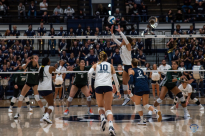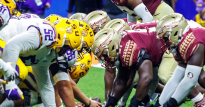MLB Lockout Update: Mar. 4
Major League Baseball entered a lockout on the first day of December. Exactly three months later, commissioner Rob Manfred announced the cancellation of the first two series of the season.
Late Monday night, optimism grew surrounding the new collective bargaining agreement. The belief was that the season would get underway as planned. The players and owners had traded offers nearly all day, and the league even added an extra day for negotiations.
The next day that optimism turned into desperation. The players declined the final proposal from the owners and the 5 p.m. deadline went with no deal.
Moments later, Manfred held a press conference from Roger Dean Stadium in Jupiter, Florida. Manfred was seen smiling, laughing and practicing his golf swing earlier in the day.
Manfred said that this was the only option for the league given that there was not enough time for the players to prepare at team facilities if an agreement were to be made.
The two sides had three months to agree but exchanged offers on only a few occasions before the final days when urgency set in. There were too many differences to settle within that timeframe and ultimately the sides could not come to an agreement.
Following the unfortunate, but unsurprising press conference, the players took to social media to express their concerns and intentions.
Faces of the sport told fans that they did not agree to the final offer because they are not only fighting for themselves but the future of the sport. This collective bargaining agreement affects more than just the present, it affects the next generation.
On the other side, the owners are negotiating for themselves and what will provide them with the most economic success. They went as far as to institute a 14-team playoff system, giving a path for nearly half of the teams to generate playoff revenue.
Professional sports are a business, but they are also so much more. The players are playing a children’s game, but doing it at the highest level. Professional athletes set an example for everyone else in the sport.
On top of that, the players are generating revenue for the owners. The fans come to see the product on the field. They are not going to ballparks to see the owners, and buying overpriced concessions is not their main priority either.
Along with the negotiations stalling out, the integrity of Major League Baseball was further questioned when Hall-of-Famer and Miami Marlins’ CEO Derek Jeter stepped down from his position.
Jeter left the position because he had a different vision than the ownership group: winning. Jeter expected additional money to be used towards player salaries, but ownership did not give it to him.
This decision was made with the integrity of the game on the line. The MLB has seen several teams cut their payrolls to extreme lows, and a person of this stature taking a stand is an important step forward.
Jeter took the side of the players in promoting the best interests of the game. The players are prepared to fight to protect the sport, even if that means losing an entire season of America’s Pastime. While fans do not want to see the whole season canceled, it could be best for baseball.
Even if the CBA had been agreed upon, it would have only masked the underlying issues in the league, not fixed them. A cancellation this season would aim to help avoid this same situation in the future.
Because of the players, the future of baseball is bright, despite the present is bleak.
Justin Ciavolella is a first-year student majoring in broadcast journalism. To contact him, email jtc5751@psu.edu.









